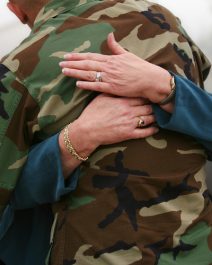The Battle at the Home Front – Raising Awareness for Suicide Prevention
I fought back tears as I sat listening to veterans tell their stories at a suicide prevention workshop. My heart ached for them, as they recounted stories of what had happened to them “in the sandbox,” and how they dealt with the demons upon returning home. Their bravery was evident while recounting their stories.
Many had lost friends to suicide and all had contemplated or even attempted it themselves. When a navy mom stood up and told her story of losing her son to suicide, I no longer fought back the tears. I was absolutely gutted. I honestly don’t know how she can even function, let alone stand in front of a room and talk about it, but admired her strength and purpose of honoring her son’s life and giving it meaning by helping others.
PTSD is the enemy that they fight now, and often times it is much more powerful than roadside bombs. Of course, it made me think of my own son. What mother wouldn’t? Was he really okay now? What had he seen over there that he hasn’t shared with me?
Being a military mom isn’t the easiest road. Some, like myself, were required to sign papers allowing our 17-year-old child to join the military. Many times, the papers are tear-stained, and the mixture of pride and guilt accompanying that signature can become devastating at times. What if I hadn’t signed those papers? Would my child have gone to college instead and had an easy office job with no anxiety issues? What if I made him wait until he was 18? Did I do the right thing?
Unfortunately, we can never rewind, and we all question many of our decisions over the years, but that one hits especially hard at times. Once our child is sworn in, we are given the title of Blue Star Mom. We hear songs like American Soldier and Letters From Home and sob uncontrollably. I still can’t listen to those songs without losing it.
 So what can a mom of a child in the military do to keep her sanity? For me, it was a constant battle. My anxiety was worst when he was deployed, of course. Five times was hard to deal with. The worry aged me. The fear and lack of control, and not knowing exactly what was going on was absolutely overwhelming. At times it felt like something was crushing my chest. For me, filling the void with giving back helped to ease the anxiety, and made me feel like I was actually doing something to help.
So what can a mom of a child in the military do to keep her sanity? For me, it was a constant battle. My anxiety was worst when he was deployed, of course. Five times was hard to deal with. The worry aged me. The fear and lack of control, and not knowing exactly what was going on was absolutely overwhelming. At times it felt like something was crushing my chest. For me, filling the void with giving back helped to ease the anxiety, and made me feel like I was actually doing something to help.
With the help of many friends and the community, we sent thousands of care packages every time my son was deployed. The first time, it was to him and nine other soldiers who were deployed with him. That was very doable. The second time he was deployed, he sent me a list of the entire unit, which totaled about 150 soldiers. That was an undertaking, but we were able to do it, with a lot of very generous donations. We also sent them to other units, even if we didn’t know anyone. Having that to work on encompassed most of my spare time after work, but it was a good thing. I got to know many of these soldiers, as they wrote back to me. It was during this time that I came up with the idea for a children’s book. One of these soldiers eventually illustrated that book.
I found the Blue Star Moms after my son was a veteran and had already separated from the army. They are a great support group to any mother of a child in the military. They are a wonderful group of women who live to serve our active duty military and veterans. I only wish that I had found them sooner! BSM’s also serve other mothers, especially those who have lost their child to war or to their battle with PTSD. They are given the title of Gold Star Mom, a title that no mother ever wants to earn.
My advice for moms of children in the military:
- Find a group like the Blue Star Moms to join. Even if you’re a very independent person, they can be a great support, provide information, and offer many volunteer opportunities for you to get involved in. It helps to be a part of a group that understands what you and your child are going through.

- Write to your child and send them packages, even if they’re not deployed. Even if they don’t say it right away, they appreciate it. Let them know that you care. If you’re financially able to, send packages to others in their unit. Some come from families who never send anything.
- Find something you’re passionate about and dive into it. For me, it was volunteering and writing a book. My book gives back to veteran’s causes, and has become my passion now. “Serving those who have served us” has become my mantra these days.
- Find a support group. Whether it’s a military mom group, your family, or your circle of friends, you’re going to need them at times. Find those people who lift you up, not bring you down. Sometimes it’s that one friend who will just sit there with you while you cry.
- Focus on the day rather than the deployment. It helps not to look at the big picture, but concentrate on what needs to get done today instead.
- Don’t be afraid to seek medical help if you need it. I did. Sometimes the anxiety gets to a point where it needs to be treated. What they don’t tell you is that often times the family members develop a form of PTSD. You have to take care of yourself.
- Whether or not you believe in organized religion, pray. Sometimes that’s the only thing that will get you through the tough times.
My focus lately has been giving back to organizations that fight PTSD and soldier suicide. PTSD is an evil enemy, and we need to do more as a country to take care of our military when they return home. Twenty-two or more veterans kill themselves on a daily basis. That is a heartbreaking statistic. One is too many. I certainly don’t have all of the answers. Our heroes are taking their own lives. No parent ever wants that knock on their door.
We have to do more.
We have to do better.
















